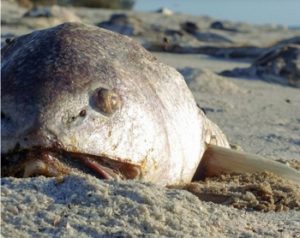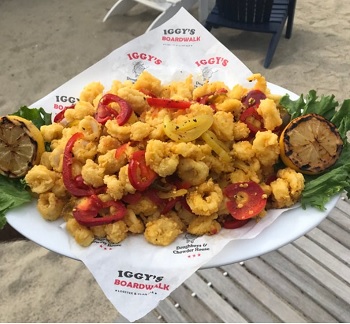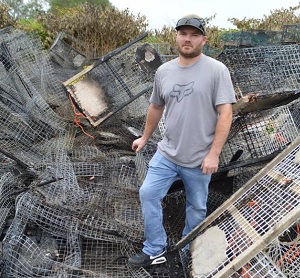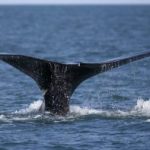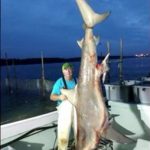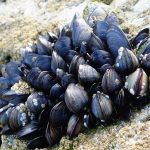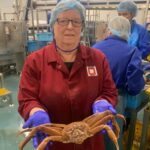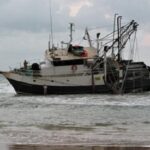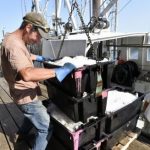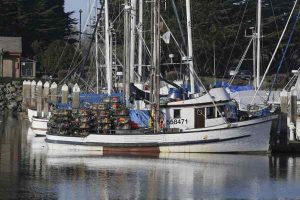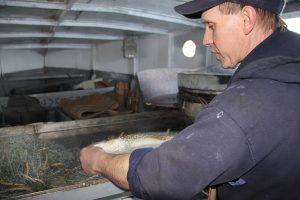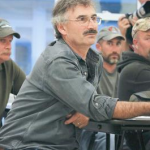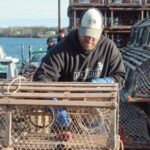Monthly Archives: August 2020

‘Good God! What in the heck was that?” A long-nosed chimaera!
A fisherman got quite the fright recently when he hauled in a strange creature with his catch. Garry Goodyear, from the town of Templeman, N.L., on the north side of Bonavista Bay, was fishing for turbot on the Grand Banks last week. He said the nets were down about 460 fathoms deep — more than 800 metres — and when the crew hauled them up later that afternoon, they all got a shock. “We’re hauling away, and by and by, I seen this coming around the roller. I said, ‘Good God! What in the heck was that?'” Goodyear said. “I’ve never seen nothing like that before!” “I found out that it was a long-nosed chimaera,” he said. >click to read< 10:07
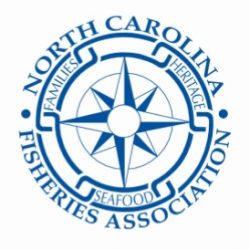
North Carolina Fisheries Association Weekly Update for August 21, 2020
Legislative updates, Bill updates, Calendar, >Click here to read the Weekly Update<, to read all the updates >click here<, for older updates listed as NCFA >click here< 09:08
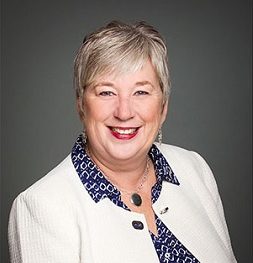
Fisheries Minister Bernadette Jordan: Liberal government remains committed to a transition away from open-net fish farms
Federal Fisheries Minister Bernadette Jordan says the Liberal government remains committed to a transition away from open-net fish farms and tough measures to preserve the chinook salmon stock. Jordan and West Vancouver-Sunshine Coast-Sea to Sky Country MP Patrick Weiler held an online town hall,,, Jordan acknowledged her mandate letter from the Prime Minister instructs her to have a transition plan in place by 2025. “This is a mandate commitment, this was a platform commitment, and it’s something that we are going to do,” Jordan said. >click to read< 08:20
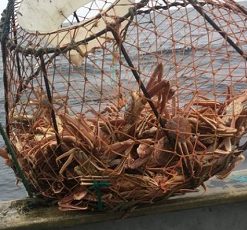
Cape Breton snow crab fishery escapes impact of right whale closures, Different story in New Brunswick
While a right whale sighting earlier this month triggered a closure to the snow crab fishery in western Cape Breton, the closure had virtually no impact. But unlike closures in other parts of the Gulf of St. Lawrence, these shutdowns had virtually no impact on the area’s lucrative fishery. “That’s something we’re discussing. Are we lucky or are we just in that sweet spot?” said Basil MacLean, a Cape Breton snow crab fisherman and president of the Area 19 Snow Crab Fishermen’s Association. In New Brunswick, where the boats and quotas are larger, it’s been a different story in 2020. “24 out of 45 members from the Acadian Crabbers Association each left significant amounts of crab in the water this spring,” >click to read< 19:15
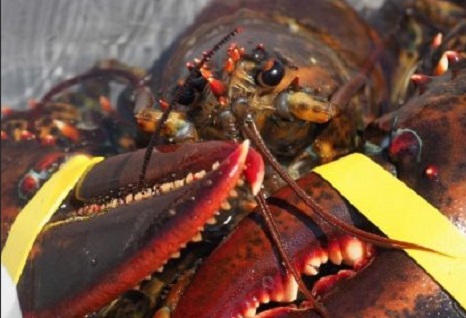
Trade Agreement Reached! European Union to eliminate tariffs on American lobsters
The United States and the European Union have reached an agreement to eliminate tariffs on American lobster, federal officials announced Friday, which could boost exports for Maine’s industry hit hard by trade wars and, more recently, the coronavirus pandemic. Reducing the tariffs has been a priority as Maine lobstermen have been at a disadvantage compared to their Canadian counterparts with respect to exports to the E.U. since the E.U. and Canada signed a trade agreement in 2018. United States Trade Representative Robert Lighthizer and European Union Trade Commissioner Phil Hogan jointly announced the agreement Friday afternoon. >click to read< 15:10
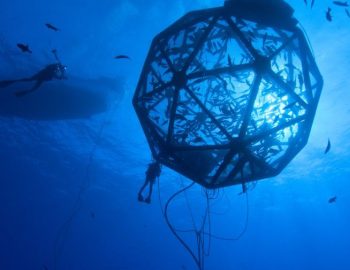
Feds select Gulf of Mexico Southern, California as potential zones for fish farming in the EEZ
The gulf joins Southern California in becoming a region for “Aquaculture Opportunity Areas,” the first two in the United States. President Donald Trump issued an executive order earlier this year outlining the concept as a way of boosting the country’s seafood industry and reducing its reliance on imported fish. The selection covers federal waters but does not identify more specific locations. “The creation of Aquaculture Opportunity Areas will foster the U.S. aquaculture industry as a needed complement to our wild capture fisheries,” said Chris Oliver, the assistant administrator for NOAA Fisheries, in a statement. >click to read< 14:14
 Commissioner Fried Welcomes NOAA Announcement – The announcement comes after Florida Agriculture Commissioner Nikki Fried sent a letter to the U.S. Commerce Secretary Wilbur Ross, asking that the department consider designating waters off Florida’s coast as an Aquaculture Opportunity Area. Echoing Commissioner Fried’s call were U.S. Senators Marco Rubio and Rick Scott, the National Aquaculture Association, the Florida Aquaculture Ass,,, >click to read<
Commissioner Fried Welcomes NOAA Announcement – The announcement comes after Florida Agriculture Commissioner Nikki Fried sent a letter to the U.S. Commerce Secretary Wilbur Ross, asking that the department consider designating waters off Florida’s coast as an Aquaculture Opportunity Area. Echoing Commissioner Fried’s call were U.S. Senators Marco Rubio and Rick Scott, the National Aquaculture Association, the Florida Aquaculture Ass,,, >click to read<

A Fishery Observer Liability Form Letter to be signed by the observer before the observer accesses the Fishing Vessel
Thanks for your help in fighting the observer redeployment issue. I have just put together a Liability letter that every boat should print out and have onboard and make any observer sign before stepping foot on their vessel. I, _____________, in my capacity as a fishery observer, fully accept any and all legal consequences if in some way my actions and interactions cause the spread of the to the crew of the vessel in which I am deployed to. >Click to read, copy, reproduce, the letter, and have signed< Since NOAA and the observer companies are refusing to accept liability if any crewmen get sick from an observer, then we must put the onus on the observer himself. Thanks, Jim Lovgren 11:22

Federal judge gives NOAA time to craft new whale rules
A federal district court judge, in a decision issued late on Wednesday, Aug. 19, gave the National Oceanic and Atmospheric Administration’s National Marine Fisheries Service (NMFS) nine more months to craft new rules to protect endangered right whales from entanglement in lobster fishing gear. Judge James E. Boasberg also denied a request by conservation organizations for an immediate ban on lobster fishing in a vast area of the ocean south of Nantucket Island in Massachusetts. >click to read< 09:45
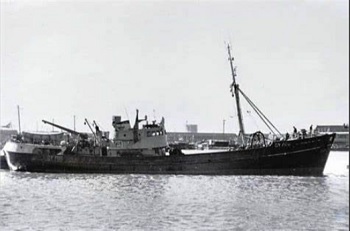
Tragedy as Blackburn Rovers war efforts ended in minefield
Before football fans raise a quizzical eyebrow, the Blackburn Rovers in question was not the town’s team but a trawler which bore the team’s name. Blackburn Rovers was one of five new ships built in 1934 for Consolidated Fisheries of Grimsby at a cost of £20,00 each, each of the trawlers carrying the name of a football club – Arsenal and Aston Villa were two other trawlers and one was even named Real Madrid.,, In anticipation of war, the Admiralty requisitioned a number of trawlers including Blackburn Rovers which were taken to the Cammel Laird shipyard in Birkenhead and equipped with submarine detection equipment, depth charge racks and a cannon mounted on her foredeck. >click to read< 08:58
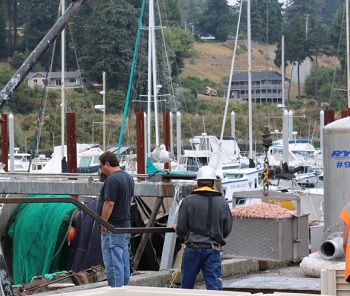
Coronavirus: Pacific Seafood reopens closed plant to process shrimp
The $9.6 million plant built by BC Fisheries LLC in 2016 closed earlier this year, leaving 30-some people without jobs and 15 local shrimp trawlers without convenient access to a buyer. But recently the Clackamas-based Pacific Seafood, which is one of the largest seafood companies in North America, took over the lease and reopened the plant to begin processing shrimp, at least for the remainder of the season. “Part of the mission of the Oregon Trawl Commission is to increase opportunities to ensure a sustainable and profitable trawl fishing industry,” Nowak said. “It’s in this spirit that we would like to recognize and thank the Port of Brookings, the state Department of Environmental Quality, Pacific Seafood and the State of Oregon for their efforts to ensure that 15 local shrimp trawlers have a buyer and processor here in our community.” >click to read< 07:27
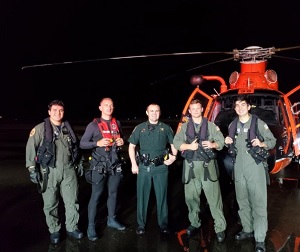
Coast Guard rescues 2 fishermen from vessel aground in St. Mary’s Inlet
The Coast Guard rescued two men after their fishing vessel ran aground in St Mary’s Inlet, Thursday. A Coast Guard Air Station Savannah MH-65 Dolphin helicopter crew arrived on scene and hoisted the two men to safety. Coast Guard Sector Charleston watchstanders received notification via phone at approximately 12:15 a.m. from the daughter of one of the men aboard the fishing vessel F/V Phuong Mai, stating that the 50-foot fishing vessel ran aground. >click to read< 11:50
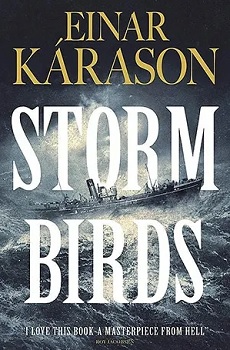
Storm Birds – an Icelandic trawler in peril
In the winter of 1959, Gudlaugsson was first engineer on a trawler that endured a monumental storm off Newfoundland. All hands were put to hacking ice from the decks in a bid to stop the vessel sinking under its weight. “It was 72 hours of fighting.” In Storm Birds, Icelandic novelist Einar Kárason has taken the story of Gudlaugsson and his crew and turned it into a pulse-quickening piece of fiction. Here the trawler is the Mávur, the Icelandic word for “seagull”, and the maelstrom is evoked by an unnamed crew member recalling the events in later life. He makes it clear that being a fisherman in Icelandic waters “could be as dangerous as soldiering in times of war”. >click to read< 09:49
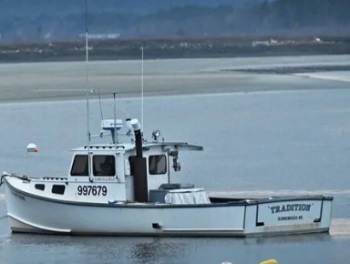
Lobstermen and boat builders catch break on diesel engine standards until cleaner-running engines are available
Lobster fishermen are getting a temporary reprieve from federal diesel engine emissions standards because the cleaner running engines have yet to hit the commercial market. “This relief gives boat builders and operators flexibility to meet EPA standards during the next several years,” Wheeler said in a prepared statement. “The larger market for diesel engines can’t build new models quickly enough for marine users – putting these operators in potential violation of pollution rules through no fault of their own.” The diesel engine standards controversy, and the possibility of a reprieve from Wheeler, has been building slowly for years, overshadowed by lobster bait shortages, the impact of the COVID-19 pandemic and the U.S.-China trade war on lobster exports, and the possibility that saving the North Atlantic right whale from extinction could mean an end to lobster fishing as it currently exists. >click to read< 08:42

Boasberg sets deadline for new North Atlantic Right Whale Protections no later than May 31, 2021
The Center for Biological Diversity, Conservation Law Foundation, Defenders of Wildlife and the Humane Society of the United States sued the federal government for violating the Endangered Species Act by allowing the lobster fishery to operate in a manner known to entangle right whales. U.S. District Court Judge James E. Boasberg also ordered a new ESA-mandated analysis of the American lobster fishery that takes into account the full scope of its harm to right whales. He stopped short of prohibiting lobster fishing with vertical buoy lines in a key right whale feeding area, which the groups had requested as an interim measure. >click to read< 07:15
Judge: Lobstering can proceed until new right whale protections are finalized in May – The right whale protection lawsuit winding its way through the federal courts for two years has often been called the “wild card” in the battle between environmental groups trying to save the critically endangered whale from extinction and Maine lobstermen trying to protect their way of life. >click to read< 17:24

UPDATE: 17th Coast Guard District to conduct maintenance on VHF radio system – anticipate intermittent service outages
JUNEAU, Alaska – The 17th Coast Guard District is scheduled to conduct maintenance on its VHF radio system Thursday from 11 a.m. to 7 p.m. Due to technical difficulties, today’s scheduled maintenance was postponed. The Coast Guard encourages all mariners throughout Alaska to remain vigilant and have a redundant means of communication with them such as: EPIRBs/PLBs (most highly recommended), Satellite messengers (second most highly recommended) Followed by: Cellphone, when in range, Satellite phone, High frequency radio communications,,, >click to read< 21:40
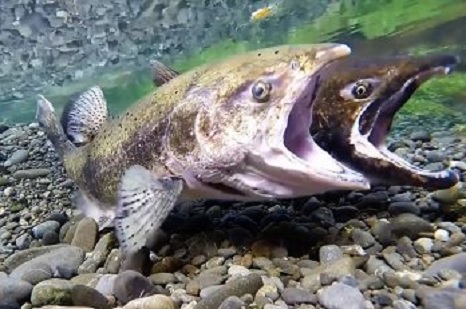
Sockeye Collapse: First Nations call for halt to B.C. salmon fishery on the Fraser River
First Nations leaders in British Columbia are calling for an emergency order from the federal government to close the sockeye salmon fishery on the Fraser River and declare it exhausted. “Without a doubt, it’s collapsed,” said Robert Phillips, an executive with the First Nations Summit and First Nations Leadership Council of B.C., in an interview with Global News on Wednesday. In an Aug. 14 report, the Pacific Salmon Commission projected a record low return this year, with just 283,000 salmon expected to make it to spawning grounds. It’s a less than a third of a projection in July, when as many as 940,000, >click tp read< 19:11

Andrew Furey sworn in as 14th premier of Newfoundland and Labrador
The surgeon and charity CEO from a political family was elected Liberal leader Aug. 3 and will replace Dwight Ball to become the 14th premier of the province. Furey, the son of Senate Speaker George Furey, was sworn in during a ceremony at Government House in St. John’s this morning. The new premier, who has never held public office and does not have a seat in the provincial legislature, will take questions at a news conference later today. Furey will inherit a troubling financial situation in Newfoundland and Labrador, with officials attributing a $2.1-billion deficit to falling oil prices and pandemic-related spending. The new premier will face the likelihood of rising electricity rates due to cost overruns from the Muskrat Falls dam and will have to manage a struggling offshore oil and gas industry. >click to read< 15:04
Athearn Marine Agency Boat of the Week: 72′ Steel Shrimper / Groundfish Dragger, Cat 3412, 2 Cummins gen sets
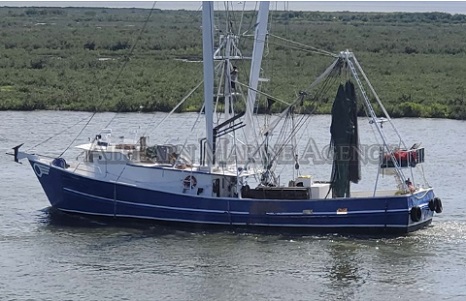 To review specifications, information and 2 photos, >click here< To see all the boats in this series, >click here< 13:46
To review specifications, information and 2 photos, >click here< To see all the boats in this series, >click here< 13:46
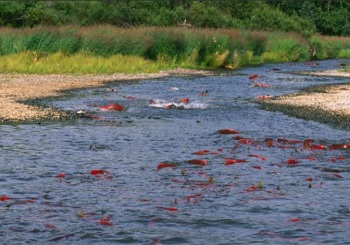
Alaska’s wild salmon are getting smaller
For years, people in Alaska have been noticing that wild salmon were getting smaller, but the reasons have been unclear. In the new study, published August 19 in Nature Communications, researchers compiled and analyzed data collected over six decades (1957 to 2018) from 12.5 million fish by the Alaska Department of Fish and Game. This unprecedented dataset enabled them to see patterns of body size changes for four species of salmon, Chinook, chum, coho, and sockeye, across all regions of Alaska. The results showed that the decreases in body size are primarily due to salmon returning to their spawning grounds at younger ages than they have in the past. >click to read< 11:24
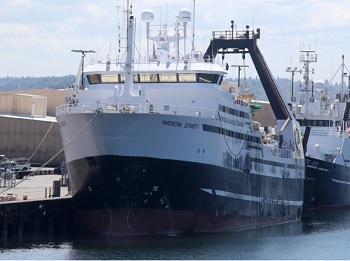
Seattle fishing boat outbreak suggests antibodies protect against coronavirus infection
Crew members from a Seattle-based fishing boat that experienced an explosive outbreak of the novel coronavirus have serendipitously provided what could be the first direct evidence that antibodies can protect people from reinfection. Blood samples collected before the vessel sailed in May showed that three of the 122 people aboard had robust levels of neutralizing antibodies, the type that block the virus from entering human cells, indicating they had been previously infected and recovered. All three were spared during the shipboard outbreak, which quickly spread to more than 85% of the crew. >click to read< 08:18

A Coast Guard investigation is underway into the capsizing of a Kodiak fishing boat
Lexie Preston, a U-S Coast Guard Petty Officer based in Juneau, said two boats collided near Whale Pass, about 22 nautical miles east of Kodiak. Preston says the Denise Marie rolled after it collided with the Alaska Eagle.,, The owner of the Denise Marie, Michael Patitucci said he and his three crew members were just wrapping up a pink salmon opener on the Denise Marie – but it wasn’t just any opener. Patitucci, who is 65, said he felt a satisfaction he had never experienced before – as if he had finally perfected the art of seining – that the crew, the boat and the fish had all been in sync. Then suddenly, they were all in the water, after the Alaska Eagle hit the stern of the Denise Marie, basically rear-ending it. >click to read< 06:42
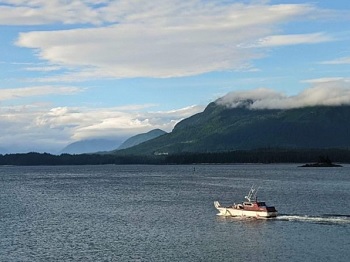
Metlakatla Indian Community suing Gov. Mike Dunleavy and senior state officials over fishing rights
The state’s sole Native reservation says the commercial fishing permit system unfairly prevents local fishermen from harvesting on their traditional fishing grounds, a right Metlakatla says is guaranteed to the tribe by Congress. The tribe of Metlakatla is asking a federal judge to prevent the state from requiring commercial fishing permits for tribal members. The people of Metlakatla have called Annette Island home since the late 19th century. That’s when roughly 820 Tsimshian people migrated with an Anglican missionary from coastal British Columbia to the then-uninhabited islands south of Ketchikan. But they weren’t just after land for a settlement. “The Annette Islands would have been worthless without access to fish and its adjacent fisheries,” attorneys for Metlakatla wrote in a lawsuit filed August 7 in federal court. >click to read< 18:06
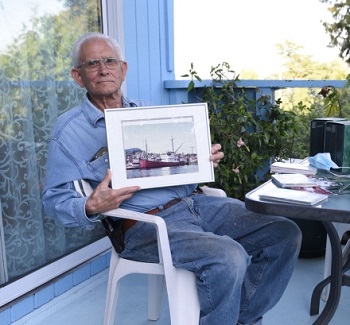
F/V Arctic Fox II remembered as ‘huge part’ of Gibson’s fishing community
As the fishing community comes to terms with the losses, a former owner remembers The Arctic Fox II’s ties to Gibsons fishing culture. It began with a cod war between England and Iceland in the 1970s. At the time Ivan Tentchoff and his wife were running an environmental summer camp. They gave children a chance to explore coastal waters from Powell River to Alaska onboard the Arctic Loon and the Arctic Fox. They were on the hunt for a larger boat to make bigger crossings. That’s how Tentchoff, now 91, ended up in the Scottish fishing town of Fraserburgh. That’s where he struck gold. >click to read< 12:00

Herrera Beutler lauds NOAA decision on sea lion removal
NOAA announced Aug. 14 that a task force had endorsed implementing the Endangered Salmon Predation Prevention Act, legislation signed into law in 2018. The administration stated that the new law amends the Marine Mammal Protection Act, allowing for removal of sea lions in a stretch of the Columbia River and its tributaries intended to cut down on predation of salmon and steelhead. With NOAA’s approval of these permits, wildlife managers can now finally take action and implement the sea lion control measure that tribes, fishermen, scientists, conservationists and local leaders have been calling for to preserve our native fish runs,” U.S. Rep Herrera Beutler >click to read< 10:46
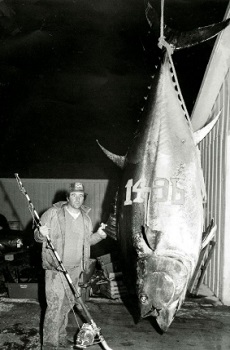
A Tuna’s Worth – Inside a Canadian fishery that pursues them
Bluefin tuna are a luxury that feeds the egos of many, the bellies of few.,, North Lake, a community too small to support an ATM, calls itself the tuna capital of the world. In the 1960s and 1970s, anglers here regularly landed bluefin that broke world records. People came from all over the planet to hunt the storied giants, which swam faster and fought harder and grew bigger than any other sport fish. In 1979, a North Lake fisher named Ken Fraser caught the largest in history, at 679 kilograms. In a black-and-white photo commemorating the event, Fraser stands wide-eyed, blood-spattered, and completely dwarfed by the hanging behemoth—as if he were the prey, not the predator.,, On the other side of the world, in Japan, bluefin was well on its way to becoming the most expensive item on sushi menus. photos, >Audio report, click to read< 09:57

A Greek tragedy? New England lobsters caught in perfect storm of warming seas and save the whales activism
Climate change, ocean acidification,,, it’s nothing compared to what will become of the industry if the self-coronated “Prince of Whales,” New Hampshire’s Richard “Max” Strahan, has his way. To lobstermen, though, Strahan has proven himself far more than a vaudevillian nuisance. The kicker, says Strahan, who gets more animated as our conversation goes on, is that the whales are pretty much doomed no matter what. In 2017, the North Atlantic right whale population didn’t reproduce at all, usually considered the death knell for an endangered species. In late June, a six-month-old right whale calf was found dead with propeller wounds off the coast of New Jersey. Lobstering had nothing to do with it, but it won’t help the industry’s case. “It’s not really that they’re being caught in fishing gear,” Strahan admits. “It’s the fact that they don’t reproduce anymore. That’s what’s killing them.” >click to read< 08:07

“The Case Against Alaska’s Pebble Mine” – Tucker Carlson goes after Pebble
Fox News pundit Tucker Carlson has become the latest influential conservative to voice concern about the proposed Pebble mine in southwest Alaska. Carlson said in his “The Case Against Alaska’s Pebble Mine” segment, there is a clear partisan split. But not with Pebble. “Suddenly,” Carlson said, “you are seeing a number of Republicans, including some prominent ones, including some very conservative Republicans, saying, ‘Hold on a moment, maybe Pebble mine is not a good idea. Maybe you should do whatever you can not to despoil nature. Maybe not all environmentalism is about climate.'” >click to read< 17:38






